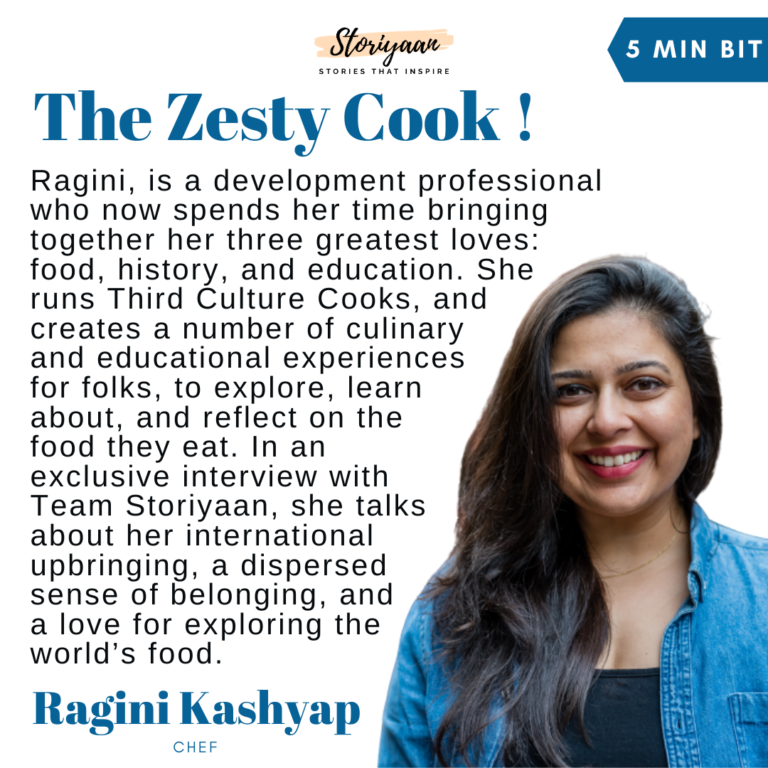Ragini Kashyap, is a development professional who now spends her time bringing together her three greatest loves: food, history, and education. She runs Third Culture Cooks, and creates a number of culinary and educational experiences for folks, to explore, learn about, and reflect on the food they eat.
Currently, Ragini is studying and eating her way through the movement of the Indian diaspora around the globe through the project “To Desi, from Desh”. She is exploring the connectedness of global cuisine through a South Asian lens. Food from the subcontinent has made its way around the world, and equally, the world has influenced what is eaten on the subcontinent. This project looks to make all of those historical links. In an exclusive interview with Team Storiyaan, she talks about her international upbringing, a dispersed sense of belonging, and a love for exploring the world’s food.

Interview
Questions and answers
Tell us about your first culinary experience in the kitchen and how it developed into a passion in the coming years?
I was always fond of cooking. At age 3, I would tell my mother whether or not her dal had enough zeera! By the time I was 8 or 9, I was baking independently. However, it was only when I got to university that I began to cook properly.
What kinds of ethnic food do you think are misinterpreted right now?
I think when a cuisine is “exported” from its place of origin, the first step that is often taken, is to make it as palatable and understandable in the new place think Indo-Chinese, or American Chinese food as an example. Slowly, over time, as the population mix changes and people become curious, actual regional recipes are highlighted. Unfortunately in this process, several regional cuisines often get clubbed together. I’m glad to see Korean food, Peruvian food and regional Indian foods get more attention rather than generic “Chinese”, “Mexican”, or “Indian”, which dominated the culinary scene 10-12 years ago.
You mentioned that you like to go to random supermarkets and pick up ingredients that you have not even heard of and then figure out how to use them. Has there ever been an ingredient that you weren't able to master and have given up on?
Unfortunately yes! I found grocery shopping in Japan to be quite challenging, and ended up picking up a couple of ingredients that I just couldn’t figure out! The Japanese have strong traditions of drying and preserving, so the trick is to know how to unlock the flavour from those ingredients. For a few of them, I just could not figure it out!
Never having lived permanently in a city/country, did you ever feel disappointment in the lack of connecting with your roots, despite the travel opportunities?
Not really, no. While culture is something that you may learn through osmosis if you grow up in your home country, when you are a third culture kid you learn things very consciously. You observe the cultures of others around you, and implicitly you have a choice as to what you incorporate into your life. I find it far more enriching to be surrounded by different cultures – it gives you real perspective as to what’s important, and what’s superfluous. It also has given me the confidence that I can make any country my home if I needed to.
What sparked your love for historical fiction in the first place ?
I think historical fiction is an incredible resource for anyone studying food history. What people ate and how they ate it is a great way to understand the social, cultural and political make-up of a culture. Food is a powerful teller of history; a dish will tell you what was in season, what was easily available, what was precious, and what was accepted.
“A person is what a person eats” is a common saying. How far is it true, and can the type of food a person prefers reflect their personality?
Absolutely; I believe strongly that someone’s attitudes towards food reflect their attitudes towards life. Whether it means judging or accepting what people eat, or being curious to try new foods and learn about them yourself. Unfortunately so much of our identity is defined by what society tells us we can/ cannot eat, that we sometimes forget these are all man-made laws. The human body can digest most edible things on the planet, and it’s in our minds that limit us.
What would be your message to amateurs planning to make their name in the culinary world?
Find your motivation and start from there. What is interesting to you? Social media is a crowded space no doubt, but the first thing that anyone looks for is authenticity, are you being yourself, or are you “playing to an audience”. If you are being yourself, and doing what speaks to you, you will attract an audience that is interested in your work.

